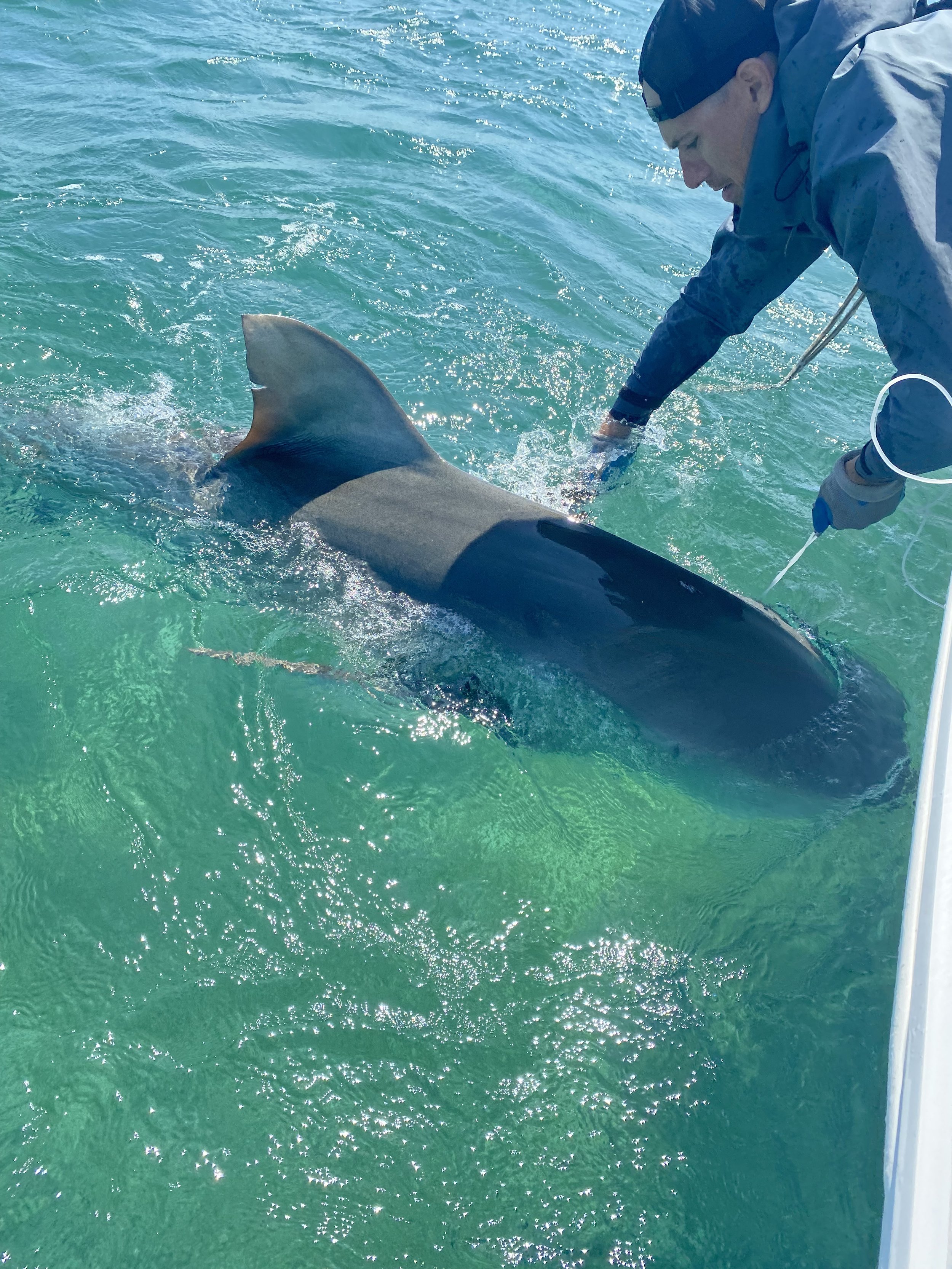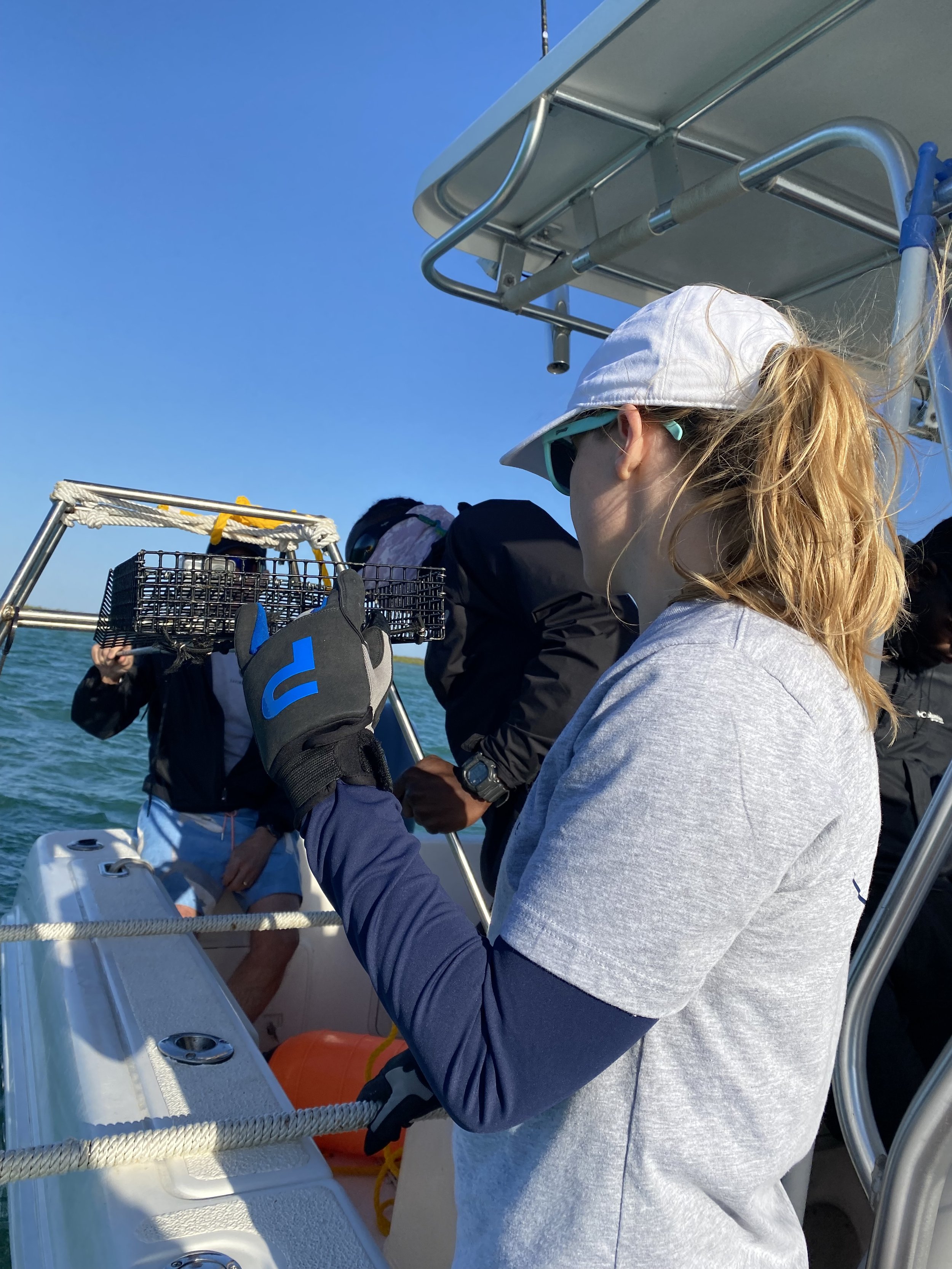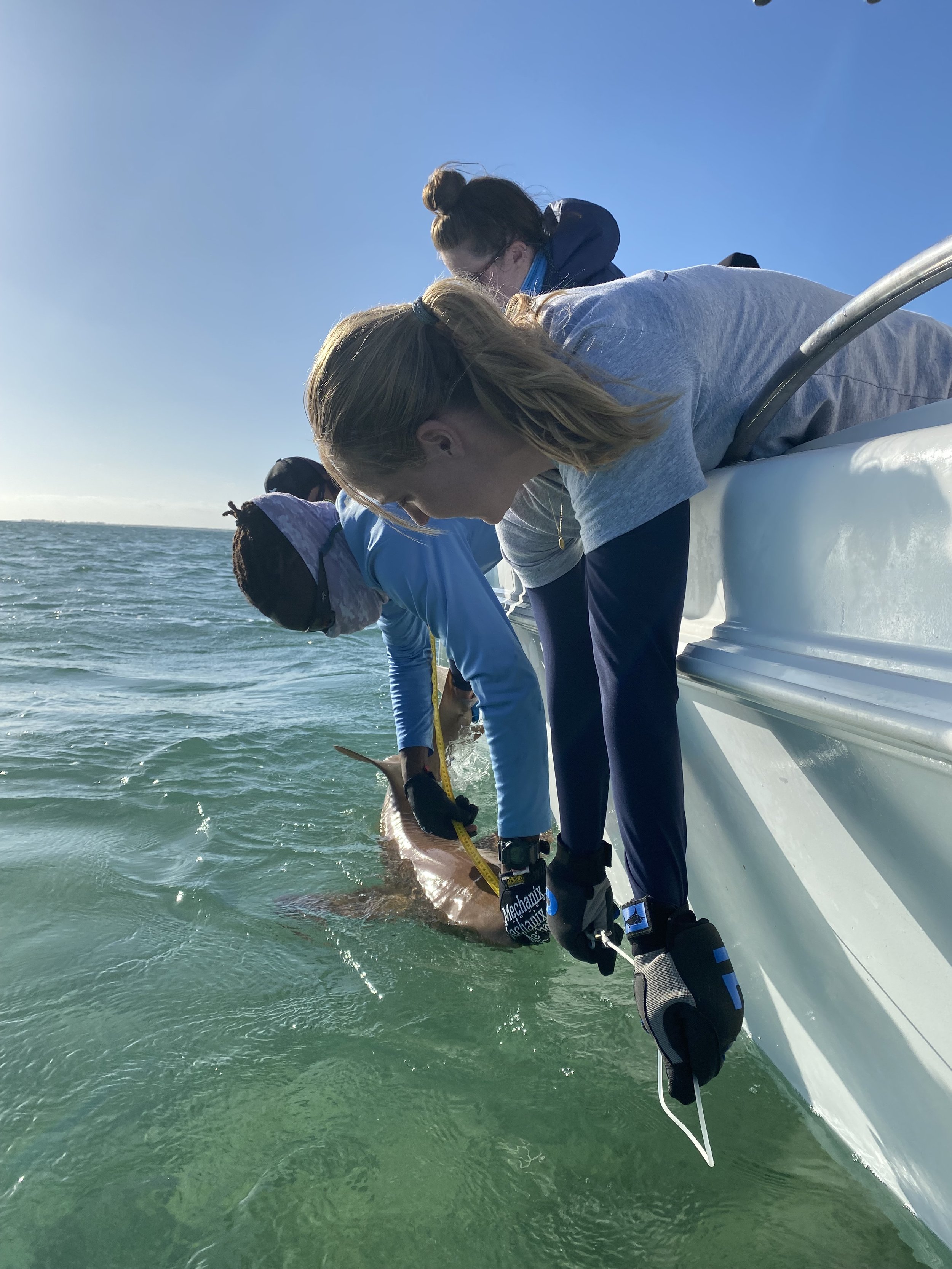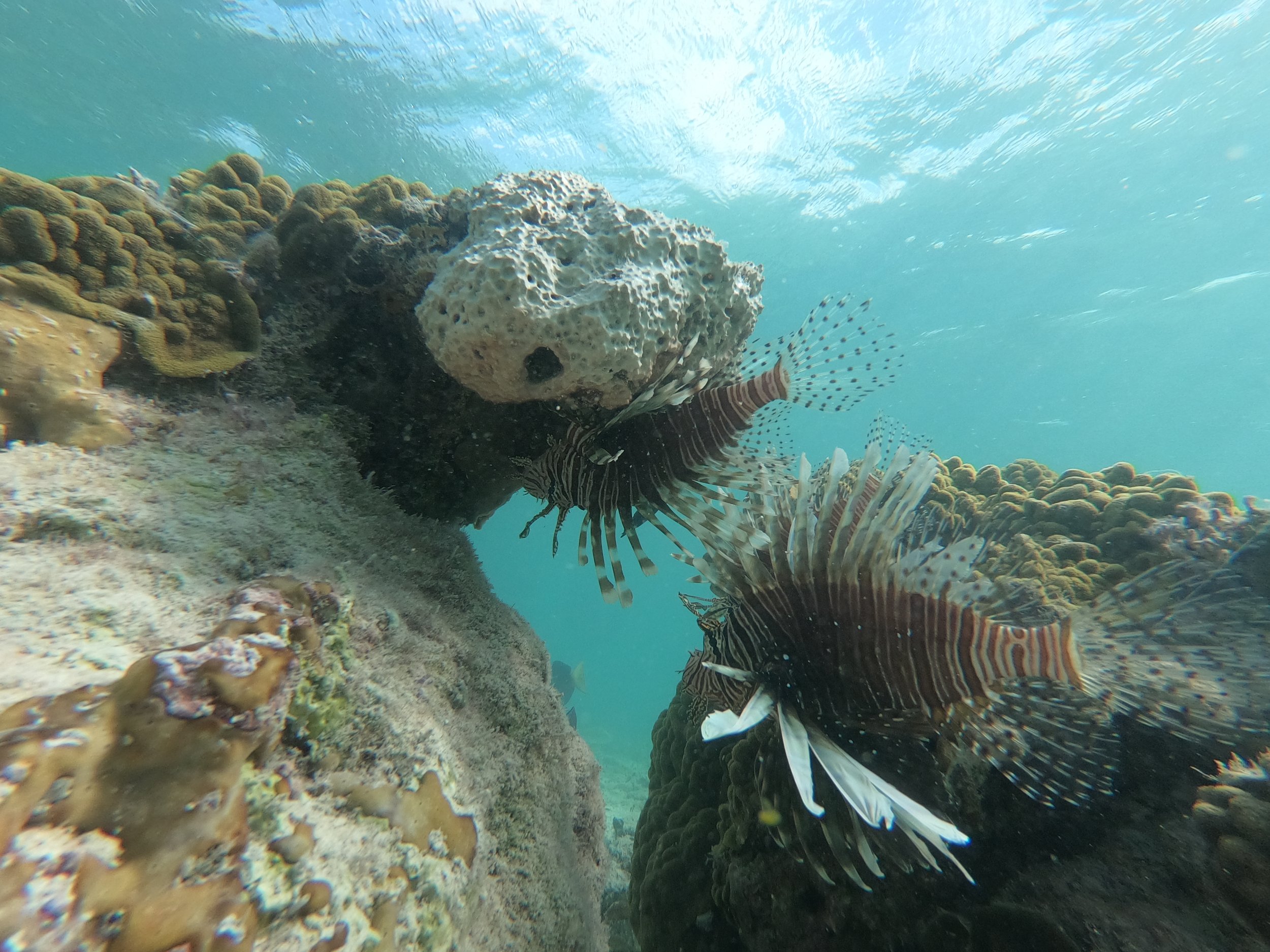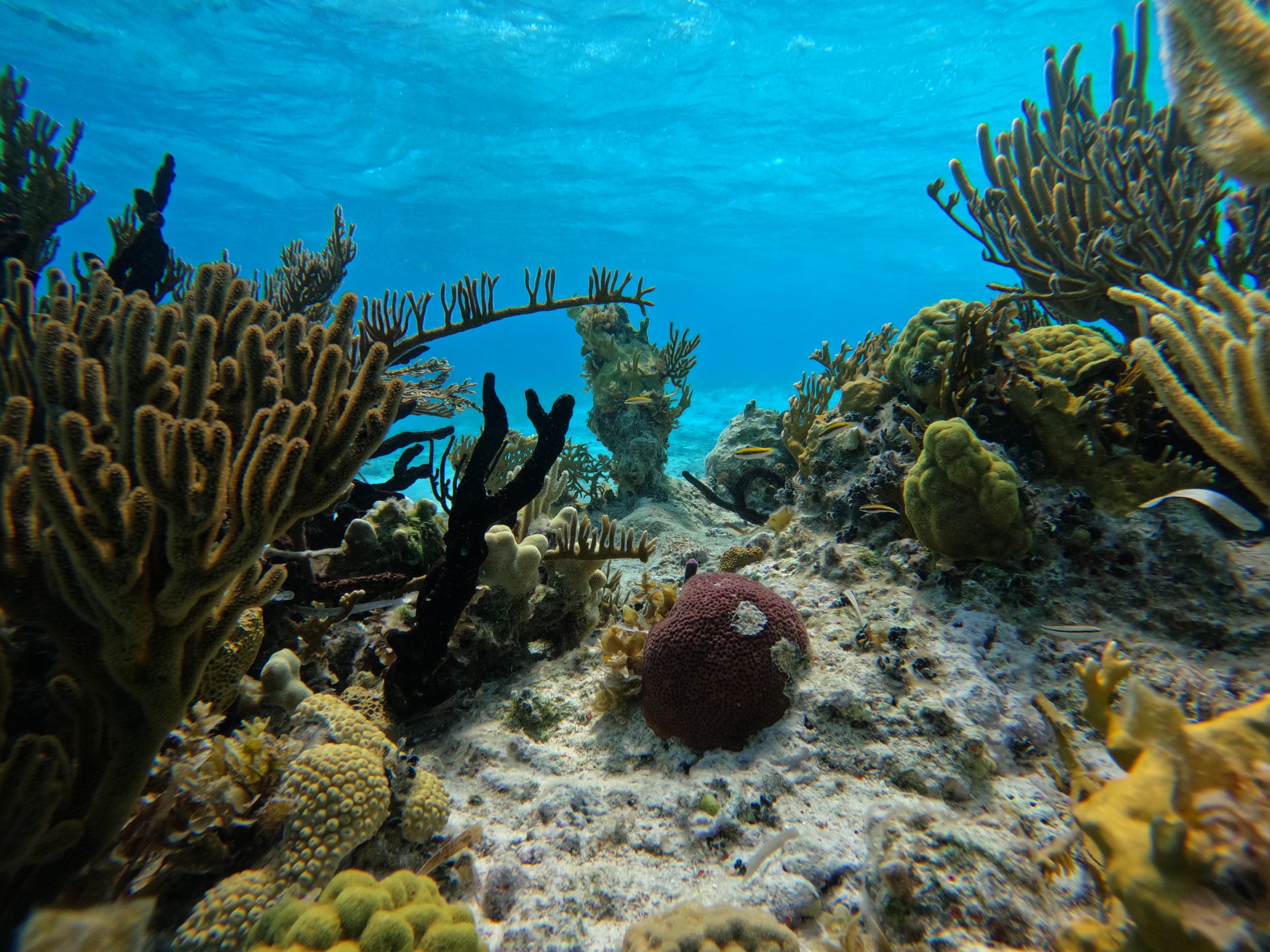Research Trip, Andros, 18-24th March, 2023
Expedition leaders: Dr. Phil Matich and Sorantaa Bain
Crew: Bree, Clark, Erin, Jake, Maite, Morgan and Stevano - Saving the Blue also hosted local marine science student Skye from BAMSI, for multiple, full day experiences with our team.
We have just returned from Saving the Blue’s third dedicated research expedition to Andros this year! In the course of our six day excursion we captured 24 healthy sharks of eight different species! This amazing week was full of not only sharks but snorkels, a dolphin encounter and lots more, read all about our week below!
Day 1
Our first day started at the airport, checking in and waiting for our bags to be loaded onto the plane, after which we were off for our new home for the week. Upon cruising over Andros, we admired the diverse habitats it offered wildlife, hoping that we would soon see some of this wildlife close up. We landed then took a taxi to the Bonefish Lodge in Cargill Creek, which provides a truly awesome vista from the rooms and main lodge. The areas we would be sampling sharks were right in our backyard. We settled in, had some lunch, and discussed the standard operating procedures for the week, including our objectives and safety protocols.
After that, we hopped on the boat and headed out to tag some sharks. The weather was windy so we chose to stay close to home in one of the nearby back reefs where a variety of shark species are often found. Rontaa and Phil briefed the team on the equipment we would deploy, and then we waited for the sharks to bite. It was difficult to tell if there were sharks on our lines, because the waves were pushing our buoys around, but one buoy was moving in a very unusual way. It was moving against the waves and slowly creeping toward another buoy. After a minute of watching this buoy closely through binoculars, we decided to investigate. And we were shocked to see a huge 2.4 m Caribbean reef shark, one of the largest we’ve caught in Andros to date. After gathering the tagging equipment from the dry storage onboard the boat, we quickly secured the shark and checked to see if she had been previously tagged. No, she was a new shark for our research, so we placed internal and external ID tags in her then measured her length. Prior to releasing her, we turned her upside down putting her into tonic immobility, and surgically implanted an acoustic transmitter in her to track her movements across Andros’s reefs. We then released her and she swam off strong!
The rest of the afternoon was full of checking and redeploying our blockrigs without additional sharks, but it was a very successful day of learning the ropes and tagging a large reef shark. We headed back to the lodge in high spirits and enjoyed a delicious dinner before getting ready for tomorrow.
We ended the day with a total of 1 sharks: A caribbean reef shark.
Day 2
We awoke and the weather was calm, so we decided to head out to the Tongue of the Ocean in pursuit of silky sharks that we would outfit with acoustic transmitters to assess their distribution and social patterns. We hoped for a sharky welcome, but the silkies were shy. However, a few emerged from the deep shortly after our arrival and we were able to successfully tag one of them, both with identification tags and an acoustic transmitter, adding to the portfolio of sharks being tracked. Despite our best efforts no other sharks showed up, so we made our way inshore to try our luck along the reef’s edge. We used a series of drop rigs in which baited hooks are suspended above the bottom with a long length of rope attached to surface buoys. Larger sharks often use deeper water, and the area where the reef drops off into the Tongue of the Ocean fits this criteria. We deployed the rigs and hoped for some action. However the action we got was not what we were hoping for. The good weather we enjoyed in the Tongue of the Ocean did not persist throughout the day, and it became too rough for us to continue to fish for sharks sagely. So we hauled the gear and changed our plans.
Because we brought gear for deep water research and the shallows were the only safe location for us to fish, we chose to explore one of the blue holes Andros is known for. After hopping in it was clear that the fish were seeking refuge from the waves in the hole and reef crevices that surround the habitat, providing the opportunity to get close to many of these animals without causing too much disturbance. Wrasses, angelfish, and others populated the area, and we enjoyed our time in the water. Once everyone was satisfied with the snorkel, we headed back to shore to clean up, dry off, and get ready for the next day.
Before dinner we enjoyed the company of some lemon sharks that frequent Cargill Creek, and also enjoyed a lecture by Dr. Phil Matich on Bahamian sharks, learning about their biology and ecology with particular interest paid to the species we would see this week. After dinner, we discussed the game plan for Day 3, then headed off to sleep to rest up for tomorrow.
We ended the day with a total of 1 shark; A silky shark.
Day 3
We sought out another reef today with the hopes of tagging some more Caribbean reef sharks to further add to those Saving the Blue is tracking to understand the extent of their habitat use, and which areas are most important. It was a slow morning of deploying and retrieving blockrigs (often called drumlines), and we added another gear type to our repertoire – baited remote underwater videos (BRUVs). BRUVs provide a complementary sampling approach to blockrigs, in which bait is placed in front of a waterproof camera to attract sharks, and the video can be viewed to assess the species, number, and sometimes size of the animals encountered. It doesn’t offer the opportunity to tag the sharks, but does provide additional data that can be used to understand shark distribution patterns.
After a slow morning, the action picked up, with a large reef shark that we quickly tagged with identification tags, measured, and outfitted with an acoustic transmitter before releasing. Then another reef shark took our bait almost immediately after releasing the first. The second shark was much larger, measuring nearly 2.2 meters. And like the first, was given identification tags, measured, and surgically implanted with an acoustic transmitter. Both reef sharks swam off strong, and we look forward to finding out which habitats they use most frequently. Then another shark took one of our baited hooks, but this shark was clearly larger based on how strongly it pulled the surface buoy. After bringing it to the side of the boat, everyone was excited to see it was a bull shark, a species that is relatively rare in the areas we conduct our research. Unfortunately, after bringing it closer to the boat we noticed it had the line in its mouth and soon bit through, swimming back toward the reef 25 feet below the surface. These bite off events do occur, but are extremely rare (<1%) indicating that losing a shark after it's hooked is the exception rather than the rule. Although we were sad that we missed the opportunity to measure how large the shark was, it clearly exceeded 2 meters, and could have been a shark tagged during a previous trip. Hopefully we’ll be lucky enough to catch it again in the future.
While working with the sharks caught today, the sky got progressively darker and shortly after losing the bull shark, we made the decision to pull our gear and head back to the lodge, which ended up being the right call. The rain started to fall, and we got quite wet, but we made it home safely and unloaded the boat once the rain slowed. After drying off and putting the gear away, we reviewed the video footage from the BRUVs, and found that our luck in the morning wasn’t the result of our effort. Very few sharks were in the area based on the video footage, which could have been due to the impending storm that pushed us off the water early. After watching the blacknose sharks that were caught on the videos, along with a sluggish sea turtle, we enjoyed dinner, then some of us engaged in another lecture before heading off to bed.
We ended the day with a total of 3 shark; one bull and two caribbean reef sharks.
Day 4
The wind that brought the storm from yesterday decided to stick around, so we sought shelter in one of the bights that bisects the island system of Andros. Like yesterday, the morning was slow, deploying and retrieving blockrigs and BRUVs without any sharks on our hooks.
In many instances, a lack of sharks can indicate that a larger shark is around leading to smaller sharks avoiding the area or making them wary about taking our bait. After some waiting, we finally hooked a shark, but it was much smaller than we expected. The small blacknose was our fourth species of the trip thus far, and their yellow coloration helps them blend into their environment. After securing the 1.1 meter female, we measured and tagged her before releasing her back into the water.
Then a massive shark took one of our hooks, submerging the surface buoy and taking it for a ride. It was clearly a large shark and would give us a fight. Upon pulling up to the line we identified the animal as a tiger shark, and after she rolled a few times it was clear she was female. It took some time to try and secure her, but unfortunately like the bull shark, she bit through the line in the last moments. In two days we had caught to very large sharks but lost them in the final stages of securing them. It was unfortunate, but reassuring that these large sharks were in the waters we were sampling, and this tiger shark was our fifth species for the trip. Surely the small blacknose we caught then released earlier was unaware of the tiger shark, or couldn’t pass up a free meal before making its way somewhere else, because tiger sharks, like many other large shark species, eat other sharks. Based on our findings we know that blacknose use a combination of the backreef and flats habitats of Andros, and can be prey for numerous species, including lemon sharks, reef sharks, bull sharks, hammerheads, and tiger sharks. We continued to deploy our blockrig equipment and BRUVs with the hope that the tiger shark would return, but she did not and with the lack of sharks attributed to her presence, she would be our last of the day.
We headed back to the lodge, cleaned the gear and the boat, and enjoyed looking through the BRUV footage again, this time revealing not just blacknose sharks, but a large blacktip, foreshadowing the sharks we would see (and catch tomorrow). After dinner we enjoyed another lecture then headed off to bed to rest up for what would be a wild Day 5.
We ended the day with a total of 2 sharks: one blacknose and one tiger shark.
Day 5
The wind did not die down, but we found a very productive research location shielded by the wind, and heavily populated by sharks. Today would be quite different from the previous 4 days, and we would more than double our shark total for the trip thus far. Shortly after deploying our blockrigs and BRUVs, the sharks started to take our bait.
Before 9am we had a nurse shark secured alongside the boat, measured and tagged, then released it. Our sixth species of the trip. And the speed by which we worked up the shark was important, because we were about to be hit with a deluge, not of rain, but of sharks. Within a period of an hour we caught, tagged, and measured five more sharks. One of these another nurse shark, but the others were blacktips – perfectly streamlined, with black accents on their fins, and an iridescent coloration that helps them blend into the water when the light hits them; an ideal predator. For each shark we secured it alongside the boat, measured its length, and fitted it with internal and external identification tags, always checking if we had previously caught it before tagging it – all of these sharks were new. These beautiful blacktips ranged from 1.2-1.8 meters, and one may have been the shark we caught on camera the day before.
Everyone was ecstatic! Our persistence had paid off, and now there were so many sharks around that we had to decide which shark to work up first because they were hitting our baited hooks at similar times! After that, one more nurse shark took our bait, which we quickly secured, measured, and tagged before releasing. Seven sharks before 11 am, what a morning! As the tide shifted, there was a lull in the action, which gave us a chance to fix hooks, grab some water and food, and catch our breath. But we weren’t finished. Early in the afternoon we caught and tagged one more nurse shark and one more blacktip, totaling nine for the day. But there was one more species that we hadn’t yet caught on our hooks, but we were well acquainted with by this time because of their visits to the lodge. Toward the end of our day, we caught and tagged a juvenile lemon shark. Like blacknose sharks, their color is strikingly similar to the sand they swim over, providing excellent camouflage to avoid being eaten by larger sharks and barracuda.
Once we measured, tagged, and released the lemon shark we decided to reward ourselves with a snorkel on an isolated patch reef tucked away from the wind. Upon first inspection, the area had little life. But after snorkeling around for a couple minutes, we were surrounded by fish. There were so many on this little isolated reef, which speaks to the value of protecting habitat that fish rely on. Parrotfish, squirrelfish and snapper were everywhere. Doctor fish, grunts, and butterfly fish filled the water. And there were also quite a few invasive lionfish.
We spent a long time on this reef, enjoying a different view of the habitat we spent much of the day catching and tagging sharks in. It was clear why these sharks were here – prey. And we were lucky to be able to quickly tag and release them so that they could continue to be predators here into the future. After the snorkel, we headed back to the lodge, and like other days looked through the BRUV videos, revealing what we already knew – there were sharks in these waters. We enjoyed our dinner and then headed to bed to rest up for Day 6, which again would be prosperous.
We ended the day with 10 sharks! five blacktips, one lemon and four nurse sharks.
Day 6
On our last full day, we awoke and sought a new sampling location, one that would hopefully have as many sharks as yesterday.
Soon after deploying our blockrigs we had one hooked – a small blacknose. We quickly measured, tagged and released the pint-sized predator, which were seemingly everywhere during our trip. After an hour we had another shark on the line, this time a feisty nurse shark that we also secured and processed quickly, which was important because we then caught three blacktips in less than an hour. Each shark was checked for previously implanted identification tags in the event they were among the sharks we tagged the day before. They were the same size as the blacktips we caught on Day 5, but all three were new individuals – there sure are a lot of blacktips in the flats of Andros! We tagged and measured each shark, then successfully released them.
After the tide switched and we suspected the sharks had moved on from the area, we pulled our gear to move to a new location. During the process we were met with some surprise guests – bottlenose dolphins! A small group of three dolphins approached and then swam alongside the boat for a few minutes. Everyone was excited to see them, and they put on a bit of a show for us, speeding back and forth past the boat playfully. After enjoying the visit from the dolphins we moved to our second location for the day, and had more success.
After a short wait, another blacktip took one of our hooks, and we quickly measured and tagged the 1.5 meter female before letting her swim off. We ended the day with another lemon shark, this one larger than the lemon shark from yesterday, and colored a brilliant yellow that stood out against the turquoise water. After we tagged, measured and released him, it was time to head back to the lodge. We enjoyed one more delicious dinner and some more time with the lemon sharks of Cargill Creek, they we headed off to bed to rest up for our last day in Andros.
We ended the day with 6 sharks! one blacknose, four blacktips, one lemon and one nurse shark.
Day 7
We decided to treat ourselves on the final day and enjoy the waters of Andros in a different way today after a successful 6 days of research. Our first stop was a site we tend to see lemon sharks, and we were not disappointed. Upon arriving, we immediately saw a small lemon shark and a blacknose cruising through the water, and within 10 minutes there were 12 sharks swimming around us.
We safely viewed them above and below the water from a nearby sandbank, and spent nearly 2 hours watching them swim around the shallows, admiring their grace and beauty. After everyone was satisfied with their lemony experience, we then made our way to a local reef to snorkel around one last time. The reef was deeper than earlier in the week, so we got the opportunity to practice some of our free diving, and fish were a bit bigger here. We watched parrotfish and surgeonfish grazing, snapper schooling, and one large barracuda who stayed just close enough to be visible along the reef and nearby seagrass bed.
After an hour we were all ready to get out and warm up, so we made our way back to the lodge for a shower, our final meal, and last minute packing before hopping in our taxis north to the airport. The flight was bittersweet, and many of us hoped to be back again for another visit in the not so distant future.
Thank you
Thank you to our research trip leaders Dr. Phil Matich and Sorantaa Bainfor guiding the team through an incredibly successful week. A huge thank you to our research assistants for their passion, determination and endless enthusiasm to work hard, learn and produce results. We would also like to thank the Andros Island Bonefish Club for their hospitality, and the hardworking and ever professional Stevano for his top class boating and captaining skills.

































